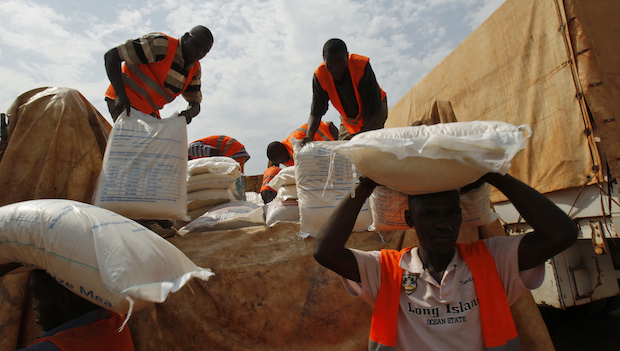
Aid workers unload food to be distributed at a camp for people displaced by the recent unrest at the Mpoko international airport of Bangui on February 12, 2014. (REUTERS/Luc Gnago)
Bangui, Reuters—A top UN official warned on Wednesday of “ethnic–religious cleansing” in the Central African Republic, as peacekeepers uncovered a mass grave at a military camp occupied by Muslim Seleka rebels in the capital Bangui.
The atrocity is the latest sign of the escalating conflict that has gripped the former French colony since March when Seleka seized power. Their campaign of rape, torture and executions against the mostly Christian population has triggered off sectarian violence which has displaced a million people.
A Reuters witness saw at least a dozen decomposed bodies at the military camp in the 200 Villas neighborhood of Bangui, where Seleka fighters have been stationed for several months.
The bodies had been stuffed into a large underground chamber, possibly a septic tank.
Pastor Antoine Mboa Bogo, head of the local Red Cross, confirmed the existence of the grave and said his staff would return to the camp on Thursday to determine the number of dead. It is not known who committed the killings.
Violence has worsened since Seleka leader Michel Djotodia resigned as president in January under international pressure. The withdrawal of Seleka troops from the country’s south paved the way for reprisals by mostly Christian “anti-balaka” militia on Muslims, causing tens of thousands of people to flee.
France has deployed around 1,600 troops to support an African Union peacekeeping force of 6,000 soldiers but they have been powerless to halt the communal violence.
On a visit to Bangui, UN High Commissioner for Refugees António Guterres called for a massive deployment of international peacekeepers to halt what he described as a “humanitarian catastrophe.”
“There is an ethnic–religious cleansing taking place. It must be stopped,” Guterres told reporters.
Attackers have reduced mosques to rubble, dragged people from their homes to be lynched, committed massacres and forced Muslim communities to flee under threat of persecution. As many as 100,000 Muslims have fled, according to Joanne Mariner of rights group Amnesty, redrawing the religious map of the country.
Le Drian says crimes must be punished
UN Secretary-General Ban Ki-moon appealed on Tuesday to France to send more troops and said he was concerned the violence in the landlocked country could spiral into genocide. He said a possible UN peacekeeping mission, requested by new Interim President Catherine Samba Panza, would take time to deploy.
French Defence Minister Jean-Yves Le Drian, who met with Samba-Panza on Wednesday, said the anti-balaka militia had emerged as the main threat to peace in the country and said those responsible for crimes would be punished.
Human Rights Watch (HRW) said in a report that the anti-balaka, whose name means “anti-machete” in the Sango language, were organized and had started to use language that suggests they want to eliminate Muslims from the country.
The militia groups Christians and animists—who wear charms on their bodies for protection – as well as members of the armed forces and supporters of toppled President François Bozizé.
“Whether the anti-balaka leaders are pursuing a deliberate policy of ethnic cleansing or exacting abusive collective punishment against the Muslim population, the end result is clear: the disappearance of longstanding Muslim communities,” said Peter Bouckaert, HRW emergencies coordinator.
In the western gold trading town of Yaloke, fewer than 500 Muslims and one mosque remain from an estimated Muslim population of 30,000 with eight mosques, said Bouckaert.
Muslims used to make up 15 percent of the population of roughly 4 million. Many worked as traders, shopkeepers and herders and their flight is severely affecting the impoverished economy, raising fears of a major food crisis.
The World Food Program began a month-long emergency airlift of around 1,800 tonnes of food on Wednesday—enough to feed 150,000 people for a month.
International forces including elite units of the Chadian military and African peacekeepers have evacuated tens of thousands of Muslims from areas under the control of anti-balaka forces in the absence of government troops.
The militias are yet to target Muslim populations in the northeast of the country, where Muslims form a majority and some reports say Muslim fighters are regrouping.

What? Obama is not going to bomb Central Africa???? wait,I thought he had to stick his nose in any and every conflict in the world, then give a speech- which of course, will make it all better…